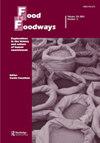大家都在议论什么呢?欢乐蜜蜂,侨民营销,以及下一阶段的快餐全球化
IF 1.1
Q2 ANTHROPOLOGY
引用次数: 3
摘要
摘要在过去的二十年里,菲律宾领先的餐饮品牌Jollibee在美国的快速服务餐饮领域取得了重大进展。虽然之前的学术报告描绘了该连锁店在国内的惊人崛起,但很少有报道详细描述该公司日益增长的国际地位,更不用说讨论其从20世纪90年代末开始向美国主要城市的持续扩张了。在这篇文章中,我考察了Jollibee在菲律宾以外的持续扩张,记录了它为建立一个可行的美国市场所做的努力,无论是在当地开设同名门店,还是购买已经在美国运营的快餐店品牌的部分或多数股权。外国资本从这些海外运营商直接涌入,以确保美国一些最持久、最新兴的快餐店的全部或多数所有权,这与在我所说的“下一阶段的快餐全球化”中开设自己的美国分店相比,起到了同样具有变革性但更不起眼的作用。“Jollibee的两个地点——一个在菲律宾,另一个在美国——的实地调查为这项食品研究分析提供了比较维度和粒度。当代媒体研究(流动和反向流动)和国际营销(海外营销)的相关概念有助于将研究结果置于更广泛的理论框架内。本文章由计算机程序翻译,如有差异,请以英文原文为准。
What’s all the buzz about? Jollibee, diaspora marketing, and next-stage fast food globalization
Abstract Over the past two decades, the Philippines’ leading restaurant brand, Jollibee, has made significant inroads into America’s quick-service dining scene. While previous scholarship has charted the chain’s phenomenal rise domestically, few accounts detail the company’s growing international standing much less discuss its ongoing expansion into major American cities beginning in the late 1990s. In this article, I examine Jollibee’s continuing spread outside of the Philippines, chronicling its efforts to establish a viable U.S. market presence whether by launching eponymous outlets at the local level or purchasing partial or majority interest in quick-service restaurant brands already operating stateside. The direct influx of foreign capital from these overseas operators to secure full or majority ownership of some of America’s most enduring and emergent quick-service eateries plays an equally transformative if more inconspicuous role than opening their own U.S. outlets in what I term “next-stage fast food globalization.” Fieldwork at two Jollibee locations—one in the Philippines and the other in the United States—provides comparative dimension and granularity to this food studies analysis. Relevant concepts from contemporary media studies (flows and contra-flows) and international marketing (diaspora marketing) help situate research findings within a broader theoretical framework.
求助全文
通过发布文献求助,成功后即可免费获取论文全文。
去求助
来源期刊

Food and Foodways
ANTHROPOLOGY-
CiteScore
2.20
自引率
0.00%
发文量
16
期刊介绍:
Food and Foodways is a refereed, interdisciplinary, and international journal devoted to publishing original scholarly articles on the history and culture of human nourishment. By reflecting on the role food plays in human relations, this unique journal explores the powerful but often subtle ways in which food has shaped, and shapes, our lives socially, economically, politically, mentally, nutritionally, and morally. Because food is a pervasive social phenomenon, it cannot be approached by any one discipline. We encourage articles that engage dialogue, debate, and exchange across disciplines.
 求助内容:
求助内容: 应助结果提醒方式:
应助结果提醒方式:


